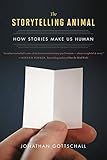The storytelling animal : how stories make us human
By: Gottschall, Jonathan
Material type: BookPublisher: New York : Houghton Mifflin Harcourt, 2013; ©2012.Description: xvii, 248 p. : ill. ; 22 cm.ISBN: 9780544002340; 0544002342Subject(s): Storytelling | Literature and science | Literature | Science and the humanitiesDDC classification: 808.5/43
BookPublisher: New York : Houghton Mifflin Harcourt, 2013; ©2012.Description: xvii, 248 p. : ill. ; 22 cm.ISBN: 9780544002340; 0544002342Subject(s): Storytelling | Literature and science | Literature | Science and the humanitiesDDC classification: 808.5/43 | Item type | Home library | Call number | Status | Date due | Barcode | Item holds |
|---|---|---|---|---|---|---|
| REGULAR | University of Wollongong in Dubai Main Collection | 808.543 GO ST (Browse shelf) | Available | T0054073 |
, Shelving location: Main Collection Close shelf browser
"Mariner Books"--T.p.
Includes bibliographical references (p. 203-230) and index.
Undiscovered and unmapped country. It's easy to say that humans are "wired" for story, but why? In this book, the author offers a unified theory of storytelling. He argues that stories help us navigate life's complex social problems, just as flight simulators prepare pilots for difficult situations. Storytelling has evolved, like other behaviors, to ensure our survival. Drawing on the latest research in neuroscience, psychology, and evolutionary biology, he tells us what it means to be a storytelling animal. Did you know that the more absorbed you are in a story, the more it changes your behavior? That all children act out the same kinds of stories, whether they grow up in a slum or a suburb? That people who read more fiction are more empathetic? Of course, our story instinct has a darker side. It makes us vulnerable to conspiracy theories, advertisements, and narratives about ourselves that are more "truthy" than true. National myths can also be terribly dangerous: Hitler's ambitions were partly fueled by a story. But as is shown in this book, stories can also change the world for the better. Most successful stories are moral; they teach us how to live, whether explicitly or implicitly, and bind us together around common values. We know we are master shapers of story. This book finally reveals how stories shape us.
The witchery of story -- The riddle of fiction -- Hell is story-friendly -- Night story -- The mind is a storyteller -- The moral of the story -- Ink people change the world -- Life stories -- The future of story.







